Caring for your Formula Fed Baby
Medically reviewed by Drugs.com. Last updated on Apr 6, 2025.
What do I need to know about caring for my formula-fed baby?
Care for your baby includes keeping him or her safe, clean, and comfortable. Your baby will cry or make noises to let you know when he or she needs something. You will learn to tell what your baby needs by the way he or she cries. Your baby will move in certain ways when he or she needs something, such as sucking on a fist when hungry.
What should I feed my baby?
- Choose the right formula for your baby. Iron-fortified formula provides all the nutrients your baby needs. Formula is available in a concentrated liquid or powder form. You need to add water to these formulas. Follow the directions when you mix the formula so your baby gets the right amount of nutrients. Ready-to-feed formula does not need to be mixed with water. Ask your baby's healthcare provider which formula is right for your baby.
- Do not add cereal to the formula. Your baby may get too many calories during a feeding. You can make more formula if your baby is still hungry after he or she finishes a bottle.
How much should I feed my baby?
- Feed your baby each time he or she is hungry. Your baby will drink about 2 to 3 ounces of formula every 2 to 3 hours when he or she is first born. As your baby gets older, he or she will drink between 26 to 36 ounces each day. When your baby starts to sleep for longer periods, he or she will still need to feed 6 to 8 times in 24 hours.
- Your baby may want different amounts each day. The amount of formula your baby drinks may change with each feeding and each day. The amount your baby drinks depends on his or her weight, how fast he or she is growing, and how hungry he or she is. Your baby may want to drink a lot one day and not want to drink much the next.
- Do not overfeed your baby. Overfeeding means your baby gets too many calories during a feeding. This may cause him or her to gain weight too fast. Your baby may also continue to overeat later in life. Look for signs that your baby is done feeding. Your baby may look around instead of watching you. He or she may chew on the nipple of the bottle rather than suck on it. He or she may also cry and try to wriggle away from the bottle or out of the high chair.
What do I need to know about feeding my baby safely?
- Hold your baby upright to feed him or her. Do not prop your baby's bottle. Your baby could choke while you are not watching, especially in a moving vehicle.
- Do not use a microwave to heat your baby's formula. The formula will not heat evenly and will have spots that are very hot. Your baby's face or mouth could be burned. You can warm formula quickly by placing the bottle in a pot of warm water for a few minutes.
How do I burp my baby?
Your baby may swallow air when he or she sucks from a bottle. This can cause gas pain. Burp your baby after every 2 to 3 ounces and again when he or she is finished eating. Your baby may spit up when he or she burps. This is normal. Hold your baby in any of the following positions to help him or her burp:
- Hold your baby against your chest or shoulder. Support his or her bottom with one hand. Use your other hand to gently pat or rub his or her back.
- Sit your baby upright on your lap. Use one hand to support his or her chest and head. Use the other hand to pat or rub his or her back.
- Place your baby across your lap. He or she should face down with his or her head, chest, and belly resting on your lap. Hold him or her securely with one hand and use your other hand to rub or pat his or her back.
How do I change my baby's diaper?
- Lay your baby down on a flat surface. Put a blanket or changing pad on the surface before you lay your baby down.
- Never leave your baby alone when you change his or her diaper. If you need to leave the room, put the diaper back on and take your baby with you.
- Remove the dirty diaper and clean your baby's bottom. If your baby has had a bowel movement, use the diaper to wipe off most of the bowel movement. Clean your baby's bottom with a wet washcloth or diaper wipe. Do not use diaper wipes if your baby has a rash or circumcision that has not yet healed. Gently lift both legs and wash his or her buttocks. Always wipe from front to back. Clean under all skin folds and creases. Apply ointment or petroleum jelly as directed if your baby has a rash.
- Put on a clean diaper. Lift both your baby's legs and slide the clean diaper beneath his or her buttocks. Gently direct your baby boy's penis down as the diaper is put on. Fold the diaper down if your baby's umbilical cord has not fallen off.
- Wash your hands. This will help prevent the spread of germs.

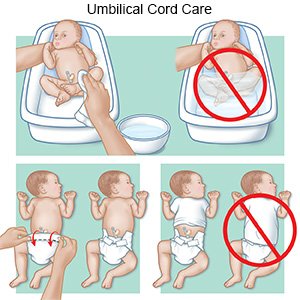 |
What do I need to know about my baby's breathing?
- Your baby's breathing may not be regular. He or she may take short breaths and then hold his or her breath for a few seconds. He or she may then take a deep breath. This breathing pattern is common during the first few weeks of life. It is most common in premature babies. Your baby's breathing should be more regular by the end of his or her first month.
- Babies also make many different noises when breathing, such as gurgling or snorting. These sounds are normal and will go away as your baby grows.
How do I care for my baby's umbilical cord stump?
Your baby's umbilical cord stump dries and falls off in about 7 to 21 days, leaving a belly button. If your baby's stump gets dirty from urine or bowel movement, wash it off right away with water. Gently pat the stump dry. This will help prevent infection around your baby's cord stump. Fold the front of the diaper down below the cord stump to let it air dry. Do not cover or pull at the cord stump.
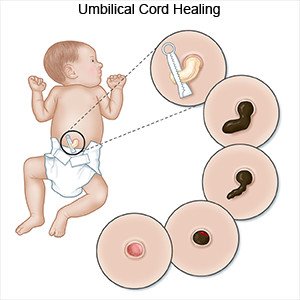 |
How do I care for my baby boy's circumcision?
Your baby's penis may have a plastic ring that will come off within 8 days. His penis may be covered with gauze and petroleum jelly. Keep your baby's penis as clean as possible. Clean it with warm water only. Gently blot or squeeze the water from a wet cloth or cotton ball onto the penis. Do not use soap or diaper wipes to clean the circumcision area. This could sting or irritate your baby's penis. Your baby's penis should heal in about 7 to 10 days.
How do I clean my baby's ears and nose?
- Use a wet washcloth or cotton ball to clean the outer part of your baby's ears. Earwax helps keep your baby's ears clean and healthy. Do not put cotton swabs into your baby's ears. These can hurt his or her ears and push wax further into the ear canal. Earwax should come out of your baby's ear on its own. Talk to your baby's healthcare provider if you think your baby has too much earwax.
- Use a rubber bulb syringe to suction your baby's nose if he or she is stuffed up. Point the bulb syringe away from his or her face and squeeze the bulb to create a gentle vacuum. Gently put the tip into one of your baby's nostrils. Close the other nostril with your fingers. Release the bulb so that it sucks out the mucus. Repeat if necessary. Boil the syringe for 10 minutes after each use. Do not put your fingers or cotton swabs into your baby's nose.
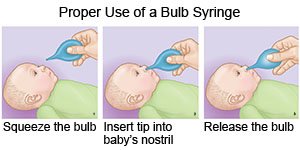
What should I do when my baby cries?
Crying is your baby's way of talking to you. He or she may cry because he or she is hungry. He or she may have a wet diaper, or be hot or cold. You will get to know your baby's different cries. It can be hard to listen to your baby cry and not be able to calm him or her down. Ask for help and take a break if you feel stressed or overwhelmed. Never shake your baby to try to stop his or her crying. This can cause blindness or brain damage. The following may help comfort him or her:
- Hold your baby skin to skin and rock him or her.
- Swaddle your baby in a soft blanket.
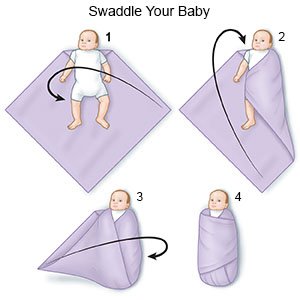
- Gently pat your baby's back or chest.
- Stroke or rub your baby's head.
- Quietly sing or talk to your baby.
- Play soft, soothing music.
- Put your baby in his or her car seat and take him or her for a drive.
- Take your baby for a stroller ride.
- Burp your baby to get rid of extra gas.
- Give your baby a soothing, warm bath.
How can I keep my baby safe when he or she sleeps?
- Always place your baby on his or her back to sleep.
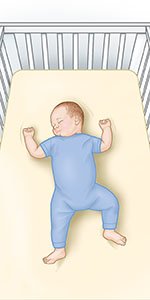
- Do not let your baby get too hot. Keep the room at a temperature that is comfortable for an adult.
- Use a crib or bassinet that has firm sides. Do not let your baby sleep on a waterbed. Do not let him or her sleep in the middle of your bed, couch, or other soft surface. If his or her face gets caught in these soft surfaces, he or she can suffocate.
- Use a firm, flat mattress. Cover the mattress with a fitted sheet that is made especially for the type of mattress you are using.
- Remove all objects, such as toys, pillows, or blankets, from your baby's bed while he or she sleeps.
How can I keep my baby safe in the car?
Always buckle your baby into a car seat when you drive. Make sure you have a safety seat that meets the federal safety standards. It is very important to install the safety seat properly in your car and to always use it correctly. Ask for more information about child safety seats.
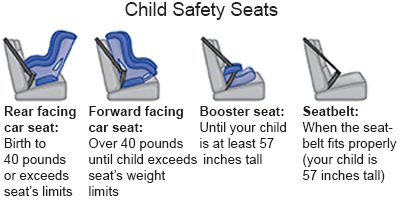 |
Call your local emergency number (911 in the US) if:
- You feel like hurting your baby.
- Your baby's lips or mouth are blue and he or she is breathing faster than usual.
When should I call my baby's pediatrician?
- Your baby's abdomen is hard and swollen, even when he or she is calm and resting.
- You feel depressed and cannot take care of your baby.
- Your baby's armpit temperature is higher than 99.3°F (37.4°C).
- Your baby's eyes are red, swollen, or draining yellow pus.
- Your baby coughs often during the day, or chokes during each feeding.
- Your baby does not want to eat.
- Your baby cries more than usual and you cannot calm him or her down.
- Your baby's skin turns yellow or he or she has a rash.
- You have questions or concerns about caring for your baby.
Care Agreement
You have the right to help plan your baby's care. Learn about your baby's health condition and how it may be treated. Discuss treatment options with your baby's healthcare providers to decide what care you want for your baby. The above information is an educational aid only. It is not intended as medical advice for individual conditions or treatments. Talk to your doctor, nurse or pharmacist before following any medical regimen to see if it is safe and effective for you.© Copyright Merative 2025 Information is for End User's use only and may not be sold, redistributed or otherwise used for commercial purposes.
Further information
Always consult your healthcare provider to ensure the information displayed on this page applies to your personal circumstances.
